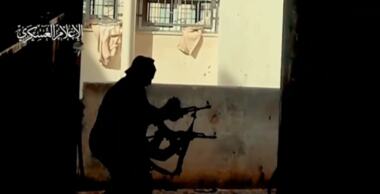
OCCUPIED AL-QUDS December 10. 2023 (Saba) - Colonel in the Zionist enemy's forces reserve Kobi Merom has admitted that the battle in Shuja'iyya and Jabalia is "very harsh" and what is taking place in the field is "a classic guerrilla war in a place that is the most fortified in the world."
Merom said in an interview with the Zionist "12" channel that this guerrilla war consists of "firing anti-tank missiles, sniper fire, explosive devices, and fighting from underground."
He added all members of his generation and even the Zionist “army,” “have never faced anything like this before.” Therefore, the matter “will take time.”
In this context, Merom pointed out “two troubling issues,” The first is “the issue of the time period of the war” and the second is that “Israel, to date, has not decided what it will do in Gaza after the ceasefire, which harms the goal of the war.”
In turn, Ron Ben Yishai, a military analyst for the Yedioth Ahronoth newspaper, told Channel 12 “Shujaiya and Jabalia are the two traditional and very solid ideological strongholds of Hamas,” stressing that “the Palestinians will fight until the end.”
Ben Yishai explained that “the Palestinian fighters are very religious, which means that they are jihadists and they will fight until the end.” He recalled the exit of elements from inside a mosque in Beit Hanoun, after the occupied area had passed to clash with his forces present there.
The Zionist analyst confirmed that "the situation in Khan Yunis is also difficult, specifically because of the prisoners."
Earlier, the Zionist enemy media reported fierce battles in Khan Yunis, the largest city in the southern Gaza Strip, indicating that Hamas is still capable of launching attacks against the Zionist forces there.
Yaniv Kubovich, military affairs correspondent for the Zionist newspaper "Haaretz", quoted the occupation "army" as saying there are four Hamas battalions in the region whose ability to launch attacks against the occupation "army" has not been affected, acknowledging that Hamas leaders are in the battle there. They still operate their forces, and can move them to areas where the occupation "army" is located.
The enemy media reported that the occupation "army" was unable to harm the Hamas movement, confirming that the movement had not lost command and control in the Gaza Strip.
This came in response to the words of the Zionist Defense Minister, Yoav Galant, in which he said that Hamas movement “began to collapse.” The Palestinian affairs commentator on the Zionist Kan channel, Elior Levy, confirmed that the Hamas movement had not weakened its main strength.
The number of Zionist soldiers killed since the start of the incursions into Gaza reached 102, bringing the total number of soldiers killed in “Al-Aqsa Flood” battle to 425.
H.H
Merom said in an interview with the Zionist "12" channel that this guerrilla war consists of "firing anti-tank missiles, sniper fire, explosive devices, and fighting from underground."
He added all members of his generation and even the Zionist “army,” “have never faced anything like this before.” Therefore, the matter “will take time.”
In this context, Merom pointed out “two troubling issues,” The first is “the issue of the time period of the war” and the second is that “Israel, to date, has not decided what it will do in Gaza after the ceasefire, which harms the goal of the war.”
In turn, Ron Ben Yishai, a military analyst for the Yedioth Ahronoth newspaper, told Channel 12 “Shujaiya and Jabalia are the two traditional and very solid ideological strongholds of Hamas,” stressing that “the Palestinians will fight until the end.”
Ben Yishai explained that “the Palestinian fighters are very religious, which means that they are jihadists and they will fight until the end.” He recalled the exit of elements from inside a mosque in Beit Hanoun, after the occupied area had passed to clash with his forces present there.
The Zionist analyst confirmed that "the situation in Khan Yunis is also difficult, specifically because of the prisoners."
Earlier, the Zionist enemy media reported fierce battles in Khan Yunis, the largest city in the southern Gaza Strip, indicating that Hamas is still capable of launching attacks against the Zionist forces there.
Yaniv Kubovich, military affairs correspondent for the Zionist newspaper "Haaretz", quoted the occupation "army" as saying there are four Hamas battalions in the region whose ability to launch attacks against the occupation "army" has not been affected, acknowledging that Hamas leaders are in the battle there. They still operate their forces, and can move them to areas where the occupation "army" is located.
The enemy media reported that the occupation "army" was unable to harm the Hamas movement, confirming that the movement had not lost command and control in the Gaza Strip.
This came in response to the words of the Zionist Defense Minister, Yoav Galant, in which he said that Hamas movement “began to collapse.” The Palestinian affairs commentator on the Zionist Kan channel, Elior Levy, confirmed that the Hamas movement had not weakened its main strength.
The number of Zionist soldiers killed since the start of the incursions into Gaza reached 102, bringing the total number of soldiers killed in “Al-Aqsa Flood” battle to 425.
H.H
resource : Saba